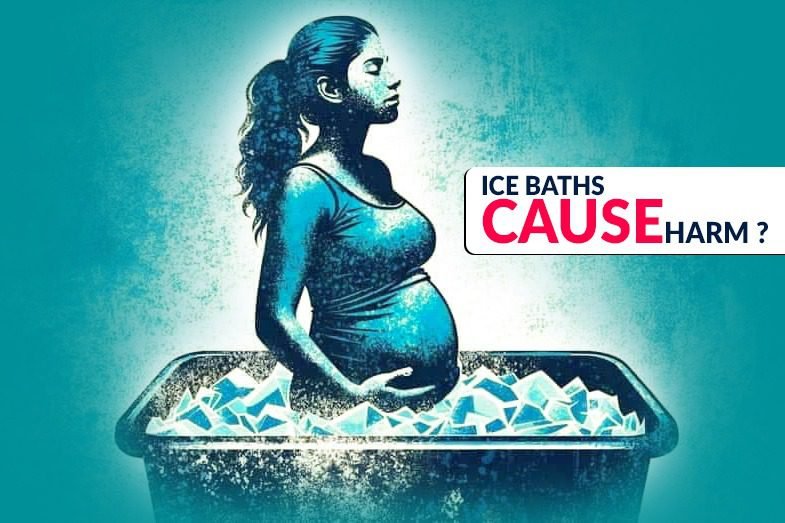HEALTH BLOG
7 Disadvantages of Ice Baths in Pregnancy: A Detailed Guide
-
Rahul Priydarss

xploring the potential risks and considerations, our detailed guide explains why ice baths are not recommended for pregnant women.
Table of Contents
Introduction:
Pregnancy is a transformative and delicate period in a woman’s life, marked by numerous physiological changes and considerations. While self-care and relaxation are essential during this time, certain practices, like ice baths, may not be suitable for expectant mothers. Disadvantages of Ice Baths In this article, we’ll explore the reasons why ice baths are not recommended for pregnant women, emphasizing the importance of safety and well-informed decision-making.
What Are Ice Baths?:
Ice baths, also known as cold-water immersion, involve submerging the body in icy water for a specific duration. This practice has historical roots and is grounded in scientific principles related to muscle recovery and overall health. This is used in your city people in higher amounts and this is very important to us for a better natural treatment process. but in this article, we discuss about Disadvantages of Ice Baths.
Disadvantages Of Ice Baths in Pregnancy:
1. Risk of Hypothermia
2. Impact on Blood
3. Circulation Or Blood Flow
4. Possible Stress on the Cardiovascular System
5. Risk of Falling and Injury
6. Possible Impact on Uterine Contractions
7. Limited Research on Pregnancy-Specific Effects
8. Alternative Safe Practices for Pregnancy
Now here are the Disadvantages of Ice Baths in pregnancy, pointwise:-
1. Risk of Hypothermia: Ice baths involve submerging the body in extremely cold water, which can lead to a rapid drop in body temperature. Pregnant women are generally more susceptible to temperature changes due to hormonal fluctuations. Exposure to cold water for an extended period may increase the risk of hypothermia, posing a potential threat to both the mother and the developing fetus.

2. Impact on Blood Circulation Or Blood Flow: Another Disadvantages of Ice Baths is that cold-water immersion can constrict blood vessels, potentially leading to decreased blood circulation to various parts of the body. This constriction may be more pronounced in pregnant women due to the increased volume of blood and hormonal changes. Impaired blood circulation can have adverse effects on both maternal and fetal well-being.
3. Possible Stress on the Cardiovascular System: Pregnancy places additional stress on the cardiovascular system, with the heart working harder to meet the increased demands. Ice baths, known to elevate heart rate and blood pressure temporarily, may add undue stress to the cardiovascular system. This stress can be concerning for pregnant women, especially those with pre-existing cardiovascular conditions.
4. Risk of Falling and Injury: The physical changes during pregnancy, such as a shift in the centre of gravity and increased joint laxity, can affect balance and stability. Submerging oneself in icy water poses an increased risk of slipping and falling, potentially causing injury to both the pregnant woman and the developing fetus.

5. Possible Impact on Uterine Contractions: Extreme cold can stimulate uterine contractions. While this response is generally not a concern for non-pregnant individuals, it could pose risks for pregnant women. Uterine contractions are a natural part of labour, and any stimulation outside the appropriate time can be problematic during pregnancy.
6. Limited Research on Pregnancy-Specific Effects: There is a scarcity of research specifically exploring the effects of ice baths on pregnant women and their unborn children. The lack of comprehensive data makes it challenging to determine the potential risks and benefits definitively. In the absence of conclusive evidence, erring on the side of caution is crucial.
7. Alternative Safe Practices for Pregnancy: Here is the last Disadvantages of Ice Baths Pregnant women are encouraged to explore alternative methods of relaxation and self-care that pose minimal risks. Gentle exercises, prenatal yoga, and warm baths (not hot or cold) are often recommended as safe alternatives that can provide relaxation without the potential hazards associated with extreme temperatures.
FAQs For Ice Baths Are Not Recommended for Pregnant Women:
1. Q: Are there any safe alternatives to ice baths for pregnant women seeking relaxation?
A: Yes, several safe alternatives, such as warm baths, gentle exercises, and prenatal yoga, can offer relaxation without the potential risks associated with ice baths during pregnancy.
2. Q: Can pregnant women take a lukewarm bath instead of an ice bath for relaxation?
A: Lukewarm baths are generally considered safer than ice baths during pregnancy. However, it’s crucial to consult with a healthcare professional to ensure that the water temperature is within a safe range.
3. Q: Are there any specific risks related to hypothermia for pregnant women in ice baths?
A: Yes, pregnant women may be more susceptible to hypothermia due to hormonal fluctuations. Extreme cold can lead to a rapid drop in body temperature, posing potential risks to both the mother and the developing fetus.
4. Q: Is there any conclusive research on the effects of ice baths specifically on pregnant women?
A: Currently, there is limited research on the pregnancy-specific effects of ice baths. The guide emphasizes the lack of comprehensive data, highlighting the importance of caution and informed decision-making.

User Review:
1. User Review: Rakail J-Johnson- ⭐⭐⭐
The guide’s insight into the potential stress on the cardiovascular system resonated with me. Pregnancy already places demands on the heart, and the thought of adding additional stress through ice baths made me reconsider their suitability during this delicate period.
2. User Review: Linda Sunak- ⭐⭐⭐⭐
The mention of the risk of falling and injury was a significant factor in my decision-making process. With changes in balance and stability during pregnancy, the idea of navigating potentially slippery surfaces during an ice bath presented an unnecessary risk that I wasn’t willing to take.
Conclusion:
Here are the conclusions and “Disadvantages of Ice Baths”, While ice baths may offer various benefits for non-pregnant individuals, they are not recommended for pregnant women due to potential risks. The well-being of both the expectant mother and the developing fetus should always be the top priority during pregnancy. Pregnant women should consult with their healthcare providers before trying any new wellness practices to ensure they align with their individual health needs and circumstances.
Remember, pregnancy is a unique and beautiful journey, and prioritizing safety ensures a healthy and positive experience for both the mother and the baby.

Recent Posts
- How Many IU of Vitamin D3 Per Day Is Safe? Recommended Dosage by Age
- Really Dave Coulier Diagnosed With Tongue Cancer
- Ruth Codd Recovering After Second Leg Amputation
- Coca Cola Cherry Bring Back With Iconic Soda Flavour
- A Man Sudden Death Due to Alpha Gal Syndrome
- Stanford Researchers Solve Epstein Barr Virus
Previous Post






